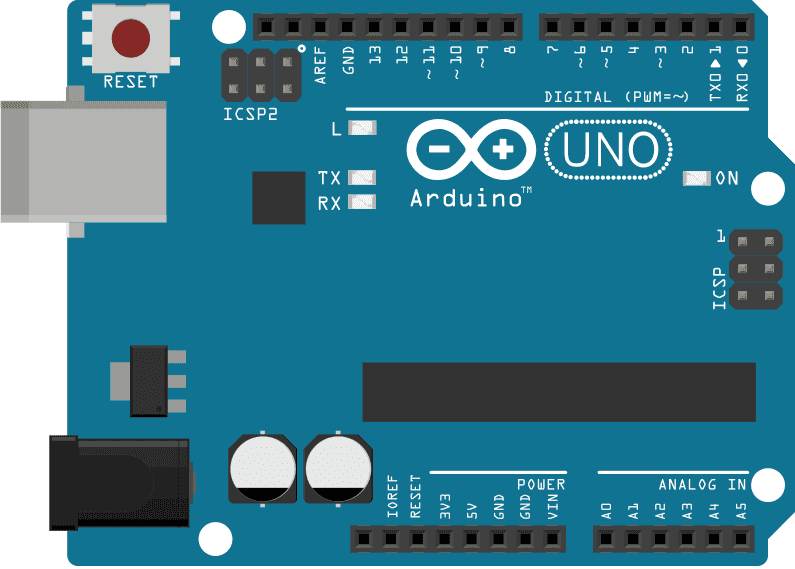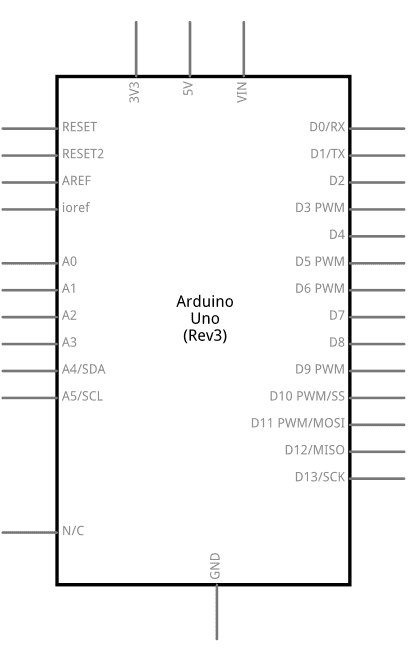EEPROM CRC
The microcontroller on the Arduino boards have 512 bytes of EEPROM: memory whose values are kept when the board is turned off (like a tiny hard drive).
A CRC is a simple way of checking whether data has changed or become corrupted. This example calculates a CRC value directly on the EEPROM values. This CRC is like a signature and any change in the calculated CRC means a change in the stored data. The purpose of this example is to highlight how the EEPROM object can be used just like an array.
Hardware Required
- Arduino Board
Circuit
There is no circuit for this example.

image developed using Fritzing. For more circuit examples, see the Fritzing project page
Schematics

image developed using Fritzing. For more circuit examples, see the Fritzing project page
Code
/***
Written by Christopher Andrews.
CRC algorithm generated by pycrc, MIT licence ( https://github.com/tpircher/pycrc ).
A CRC is a simple way of checking whether data has changed or become corrupted.
This example calculates a CRC value directly on the EEPROM values.
The purpose of this example is to highlight how the EEPROM object can be used just like an array.
***/
#include <Arduino.h>
#include <EEPROM.h>
void setup() {
//Start serial
Serial.begin(9600);
while (!Serial) {
; // wait for serial port to connect. Needed for native USB port only
}
//Print length of data to run CRC on.
Serial.print("EEPROM length: ");
Serial.println(EEPROM.length());
//Print the result of calling eeprom_crc()
Serial.print("CRC32 of EEPROM data: 0x");
Serial.println(eeprom_crc(), HEX);
Serial.print("\n\nDone!");
}
void loop() {
/* Empty loop */
}
unsigned long eeprom_crc(void) {
const unsigned long crc_table[16] = {
0x00000000, 0x1db71064, 0x3b6e20c8, 0x26d930ac,
0x76dc4190, 0x6b6b51f4, 0x4db26158, 0x5005713c,
0xedb88320, 0xf00f9344, 0xd6d6a3e8, 0xcb61b38c,
0x9b64c2b0, 0x86d3d2d4, 0xa00ae278, 0xbdbdf21c
};
unsigned long crc = ~0L;
for (int index = 0 ; index < EEPROM.length() ; ++index) {
crc = crc_table[(crc ^ EEPROM[index]) & 0x0f] ^ (crc >> 4);
crc = crc_table[(crc ^ (EEPROM[index] >> 4)) & 0x0f] ^ (crc >> 4);
crc = ~crc;
}
return crc;
}See also
EEPROM Clear - Fills the content of the EEPROM memory with "0".
EEPROM Read - Reads values stored into EEPROM and prints them on Serial.
EEPROM Write - Stores values read from A0 into EEPROM.
EEPROM Iteration - Programming examples on how to go through the EEPROM memory locations.
EEPROM Put - Put values in EEPROM using variable semantics (differs from EEPROM.write() ).
EEPROM Get - Get values from EEPROM and prints as float on serial.
EEPROM Update - Stores values read from A0 into EEPROM, writing the value only if different, to increase EEPROM life.
Last revision 2018/05/17 by SM